Children's Books for Labor Day
- Christina Dendy

- Sep 4, 2023
- 6 min read
Updated: Sep 14, 2023
Happy Labor Day! Today is a day to celebrate workers, but often, that gets lost in the hubbub of picnics, parades, barbecues, yard work, and for those who don't get the day off, labor.
Labor Day was first celebrated in 1882 in New York City. More than 10,000 people took part in parades through the city that day. Many took off work to do so.
For more than a decade, individual cities and states responded to calls from labor groups for a day to take a break and celebrate the achievements of the nation's workforce. These calls came in the wake of massive waves of industrialization and reorganization of business and labor models. Dramatic technological and economic shifts in the country (and other parts of the world) largely moved labor away from artisanship and cottage industries, from individual- and family-run shops and trades, to large-scale commercial businesses. They gave rise to corporations, autonomous entities of dubious nature granted personhood and the rights of citizens, a move that insulated owners and investors from the worst consequences of profit-driven decisions. At the same time, labor was mechanized and standardized. It became a commodity as much as a resource, something to be bought and sold. A bit about the impact of industrialization ...
This all had myriad effects, elevating the earning capacity and living standards of some, increasing purchasing power and decreasing the cost of mass-produced consumer goods, while also subjecting the masses, including children, to unsafe and unsavory working conditions. Long hours, low pay relative to the earnings of owners, and dangerous processes and environments threatened workers' health and contributed to the overcrowding and unsanitary, unhealthful situations in growing cities. Wealth disparity increased exponentially, and economic panics and crashes ensued decades before the Great Depression. I could go on a while about that. The gist is that workers (including farmers) had lots to deal with in the late 1800s, and they had determined that they could better achieve reforms (positive improvements) by banding together to demand them. Enter labor unions and farmers' groups like cooperatives and granges. Here's a truncated history of the labor movement followed by a video on child labor ("ended" being a loosely used verb there) ...
By 1894, more than 20 states had labor celebrations. That year, more than 150,000 railroad workers across 27 states and territories went on strike in the Pullman Railroad Car Company Strike. They were protesting wage cuts as well as reprisals against labor organizers, specifically the firing of union representatives. Like many other strikes, it was met with violence. In its wake, Congress passed and President Grover Cleveland signed a federal law instituting Labor Day as a national holiday celebrated the first Monday each September.
Today, Labor Day, like its cousins Memorial Day and Veterans Day, centers on recreational and leisure activities (even if they turn out to take more effort than work does) for those who get the day off. Certainly, many people recall that it's about workers and labor rights and policies. However, many do not, or give the concepts only peripheral nods. Wealth disparity in the United States (and the world) is greater than ever. Many people work multiple jobs and many households struggle to keep up with the rising costs of living, particularly food, housing, healthcare, transportation, childcare, etc. Many people point to empty positions, particularly in the service industry, without acknowledging the discrepancies in what it costs people to work those jobs. Many such positions are underpaid relative to the mental and physical energy exerted. People are expected to work in harsh conditions and deal with all kinds of behaviors for little pay. At the same time, many must pay to work, and the offset in childcare costs relative to expected earnings is untenable. Those are short generalizations that do not justice to the full scope of issues confronting American workers today.

The system simply isn't set up to allow everyone who wants to succeed to actually pull themselves up by their proverbial bootstraps and prosper ... or whatever other mythologies have been popularized in the past 150+ years. Plus, the system, whether you acknowledge it or not, does tend to favorite certain privileged groups, increasing the likelihood of advancement among individuals from those groups while making it harder for those in marginalized groups to escape their socioeconomic contexts. But we're not supposed to talk about that these days. Any attempt to discuss the full scope of history, the many perspectives and truths, are now pigeonholed as critical race theory, revisionist history, and leftist propaganda. Never mind that the primary source material supports the expansion of the narrative, which in reality has suffered from tunnel vision for much of the nation's history.
At any rate, Labor Day deserves attention not only as a holiday for "taking a break," if you can, but also as a day of remembrance, education, awareness, and action. As a parent, teacher, librarian, or other adult charged with shepherding young minds, I propose the following children's books as avenues to exploring themes and events related to labor history:
Children's Books About Labor
Brave Girl: Clara and the Shirtwaist Makers' Strike of 1909 by Michelle Markel and Melissa Sweet Biographical picture book about Clara Lemlich, a Ukrainian immigrant to the United States, who helped lead a strike among New York City’s garment workers in the early 1900s
Fictional picture book based on the events of the successful janitors’ strike in Los Angeles in 2000
Memphis, Martin, and the Mountaintop: The Sanitation Strike of 1968 by Alice Faye Duncan and R. Gregory Christie
Historical fiction picture book about nine-year-old Lorraine Jackson and the Memphis sanitation strike of 1968 in which Dr. Martin Luther King, Jr., also participated
Kristy Caldwell, and STEADFAST: Frances Perkins, Champion of Workers' Rights by Jennifer J. Merz
Biographical picture books about Frances Perkins, who witnessed the Triangle Shirtwaist Factory fire, served as the nation's first woman secretary of labor, and helped achieve reforms like social security
I Like, I Don't Like by Anna Baccelliere and Ale + Ale
A thematic picture book that calls attention to global child labor and disparity through the lens of different perspectives on goods
Click, Clack Moo: Cows That Type by Doreen Cronin and Betsy Lewin
Fiction picture book about barnyard animals that organize to demand change
Mother Jones and Her Army of Mill Children by Jonah Winter and Nancy Carpenter and On Our Way to Oyster Bay: Mother Jones and Her March for Children's Rights by Monica Kulling and Felicita Sala
Semi-biographical historical picture books about labor organizer Mary "Mother" Jones and the 100+ mill children who marched from Philadelphia to Theodore Roosevelt's home in New York in 1903 to demand an end to child labor
The Paper Kingdom by Helena Ku Rhee and Pascal Campion
Fiction picture book about a boy who accompanies his parents, who work as nighttime office cleaners, to their job
Side By Side: The Story of Dolores Huerta and César Chavez by Monica Brown and Joe Cepeda, Dolores Huerta: A Hero to Migrant Workers by Sarah Warren, and Harvesting Hope: The Story of Cesar Chavez by Kathleen Krull and Yuyi Morales
Biographical picture books about labor leaders Dolores Huerta and César Chavez and their efforts to organize farm workers in the 20th century
Which Side Are You On? The Story of a Song: The Story of a Song by George Ella Lyon and Christopher Cardinale
Semi-biographical historical picture book about a union song written by Florence Reece in 1931 during a coal miner strike in Kentucky
Me and Momma and Big John by Mara Rockliff and William Low
Fiction picture book about a child's perspective on his mother's work as a stonecutter building a cathedral

All Through the Night: People Who Work While We Sleep by Polly Faber and Harriet Hobday, The Night Worker by Kate Banks and Georg Hallensleben, Night Job by Karen Hesse and G. Brian Karas
Thematic and fiction picture books about the people who go to work at night
Someone Builds the Dream by Lisa Wheeler and Loren Long
Thematic lyrical picture book about the laborers behind the finished products
Steady Hands: Poems About Work by Tracie Vaughn Zimmer
A collection of illustrated poems about different kinds of work inspired by Walt Whitman's "I Hear America Singing"

Also, here's a list of some greater older reads for tweens and teens on Labor Day! Several of these are going on my list: Labor Day Books for Teens from Upstate Ramblings.






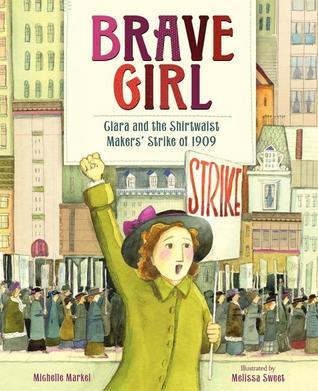

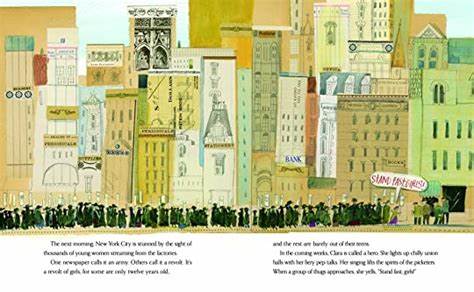
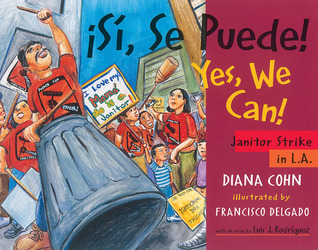

















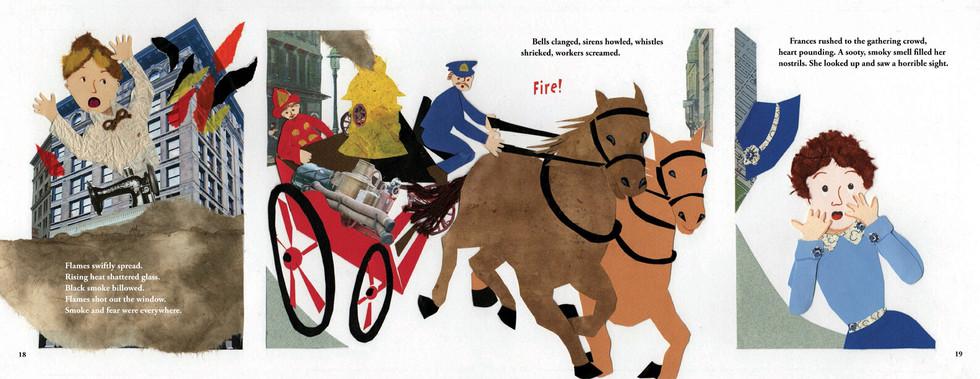



















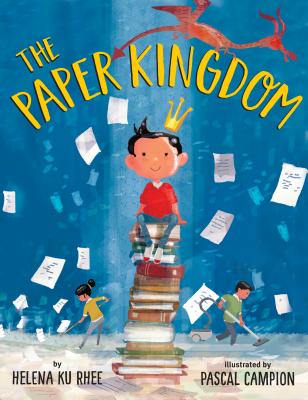



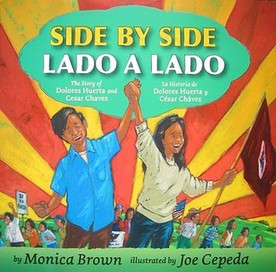





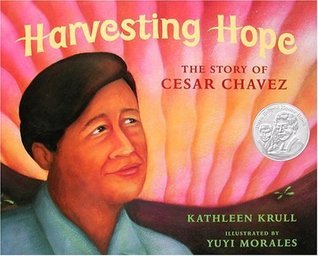

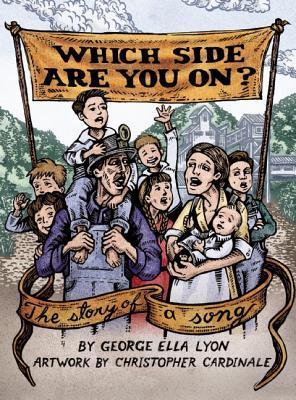












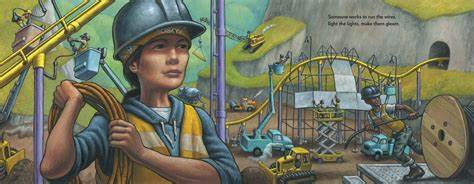


Comments